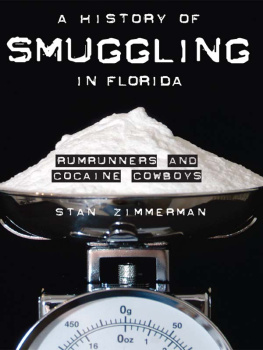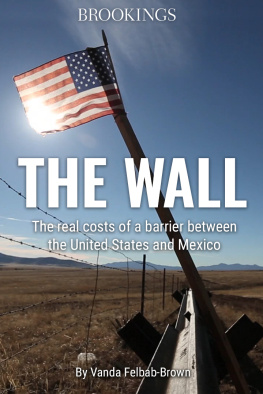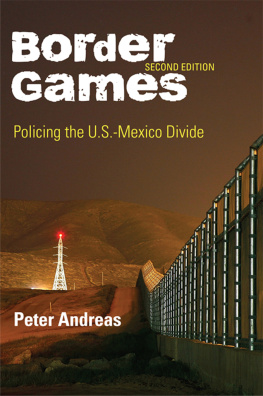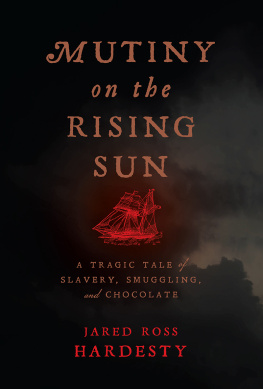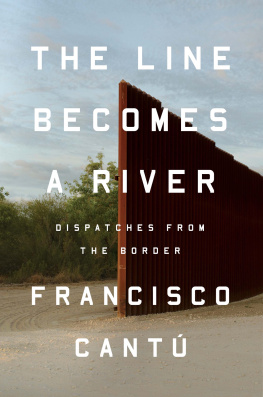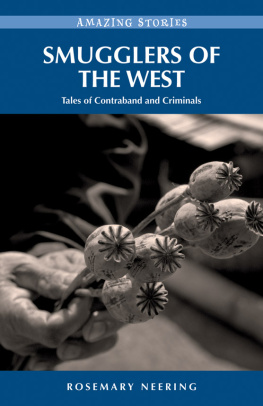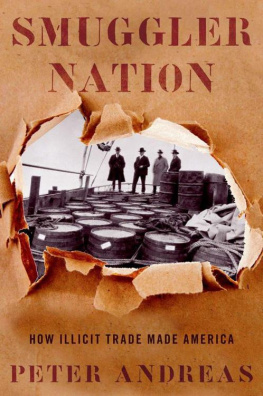George T. Díaz - Border Contraband: A History of Smuggling across the Rio Grande
Here you can read online George T. Díaz - Border Contraband: A History of Smuggling across the Rio Grande full text of the book (entire story) in english for free. Download pdf and epub, get meaning, cover and reviews about this ebook. year: 2015, publisher: University of Texas Press, genre: Politics. Description of the work, (preface) as well as reviews are available. Best literature library LitArk.com created for fans of good reading and offers a wide selection of genres:
Romance novel
Science fiction
Adventure
Detective
Science
History
Home and family
Prose
Art
Politics
Computer
Non-fiction
Religion
Business
Children
Humor
Choose a favorite category and find really read worthwhile books. Enjoy immersion in the world of imagination, feel the emotions of the characters or learn something new for yourself, make an fascinating discovery.

- Book:Border Contraband: A History of Smuggling across the Rio Grande
- Author:
- Publisher:University of Texas Press
- Genre:
- Year:2015
- Rating:4 / 5
- Favourites:Add to favourites
- Your mark:
- 80
- 1
- 2
- 3
- 4
- 5
Border Contraband: A History of Smuggling across the Rio Grande: summary, description and annotation
We offer to read an annotation, description, summary or preface (depends on what the author of the book "Border Contraband: A History of Smuggling across the Rio Grande" wrote himself). If you haven't found the necessary information about the book — write in the comments, we will try to find it.
In this first history of smuggling along the U.S.-Mexico border, Daz shows how illicit trade evolved from a common practice of ordinary people into a professional, often violent, criminal activity.
George T. Díaz: author's other books
Who wrote Border Contraband: A History of Smuggling across the Rio Grande? Find out the surname, the name of the author of the book and a list of all author's works by series.
Border Contraband: A History of Smuggling across the Rio Grande — read online for free the complete book (whole text) full work
Below is the text of the book, divided by pages. System saving the place of the last page read, allows you to conveniently read the book "Border Contraband: A History of Smuggling across the Rio Grande" online for free, without having to search again every time where you left off. Put a bookmark, and you can go to the page where you finished reading at any time.
Font size:
Interval:
Bookmark:
INTER-AMERICA SERIES / EDITED BY HOWARD CAMPBELL, DUNCAN EARLE, AND JOHN PETERSON
In the new Inter-American epoch to come, our borderland zones may expand well past the confines of geopolitical lines. Social knowledge of these dynamic interfaces offers rich insights into the pressing and complex issues that affect both the borderlands and beyond. The Inter-America Series comprises a wide interdisciplinary range of cutting-edge books that explicitly or implicitly enlist border issues to discuss larger concepts, perspectives, and theories from the borderland vantage and will be appropriate for the classroom, the library, and the wider reading public.
GEORGE T. DAZ
Border Contraband
A HISTORY OF SMUGGLING ACROSS THE RIO GRANDE

University of Texas Press
AUSTIN
Copyright 2015 by the University of Texas Press
All rights reserved
First edition, 2015
Requests for permission to reproduce material from this work should be sent to:
Permissions
University of Texas Press
P.O. Box 7819
Austin, TX 78713-7819
http://utpress.utexas.edu/index.php/rp-form
LIBRARY OF CONGRES CATALOGING-IN-PUBLICATION DATA
Daz, George T., 1980
Border contraband : a history of smuggling across the Rio Grande / by George T. Daz. First edition.
pages cm. (Inter-America series)
Includes bibliographical references and index.
ISBN 978-0-292-76106-3 (cloth : alk. paper)
1. SmugglingMexican-American Border RegionHistory. 2. Rio Grande (Colo.-Mexico and Tex.)History. 3. Mexican-American Border RegionHistory. I. Title.
HJ6690.D53 2015
364.1'33609721dc23
2014011403
doi: 10.7560/761063
ISBN: 978-0-292-76107-0 (library e-book)
ISBN: 978-0-292-76108-7 (individual e-book)
For my mother and father
Contents
Acknowledgments
After ten years of working on this topic I have a great many people to thank. My time at Southern Methodist University was the happiest time of my life, and the wonderful people I met there nurtured me greatly. Sincere thanks to my mentor, Ben Johnson, who provided endless guidance and challenging questions that prompted me to make connections where I once saw none. John Chvez offered innumerable insights and served as a source of encouragement throughout the writing process. Octavio Herrera Prez contributed valuable knowledge on the economic and borderland history of Mexico, and his comments helped refine the book you are reading. I greatly appreciate the assistance of the William P. Clements Center for Southwest Studies, particularly Andrea Boardman and Ruth Ann Elmore for their tireless support, logistical and otherwise. The anonymous donors of the Bill Clements Dissertation Fellowship gave me the resources and time I needed to complete my doctoral work, and their support helped immensely. My education at SMU would have been entirely impossible without the vision of David Weber, who established its doctoral program in history. Professor Weber read one of my early papers on contrabandistas, and his enthusiasm convinced me to stick with my topic. The viceroy is greatly missed.
Additionally, I am thankful for the excellent education provided by Texas A&M International University in Laredo. As an undergraduate and graduate student at TAMIU, I benefited tremendously from the mentor-ships of Jerry Thompson, Stanley Green, Carlos Cullar, and Deborah Blackwell, and I am happy to say that these collegial relationships did not end when I left my alma mater, but continue to this day.
Many scholars also assisted me along the way. I would like to especially thank Arnoldo De Len, Elaine Carey, and Andrae Marak for their interest in my work and for their general care about my professional development. Oscar J. Martnez, Miguel ngel Gonzlez Quiroga, Stephen Haber, Brian DeLay, Kelly Lytle Hernndez, Andrew Graybill, James Sandos, Andres Resndez, Tom Miller, and Robert Utley were kind enough to answer questions that came up in my investigations, and I am very thankful for their expertise. Howard Campbells and Josiah McC. Heymans interest and encouragement in my work came at a critical time in my career and helped me believe in myself when few others did.
During my time at South Texas College, I had the good fortune of working with a talented and dedicated group of people who welcomed me and made being in the office a joy. Special thanks to Jeff Zents, Moraima Cardenas, and Ana Riojas for their friendship and for showing me what is best about teaching. The dedication of Jenny Clark, Tammy Slippy, and Mara Esther Rodrguez to womens studies showed me what is best about service, and I am grateful to have worked beside them. The efforts of Trinidad Gonzales, Esther Garca, and Victor Gmez in Mexican American studies impressed upon me the value of engagement with the community in which you work. I credit Victor in particular for motivating me to work harder and to not settle for less.
You cannot make a house without bricks, and you cannot write a history without sources. I would like to extend my deepest gratitude to Barbara Rust and the staff of the National Archives and Records Administration in Fort Worth; Joan Gosnell, the Good Fairy of the DeGolyer Library; Jeanette M. Hatcher and her staff at the special collections at the Killam Library at Texas A&M International University; Joe Moreno of the special collections at the Laredo Public Library; George Gause (recently retired) from the University of TexasPan American; and Adn Benavides at the Benson Latin American Collection at the University of Texas at Austin for their generous assistance. Manuel Ramos Medina of the Centro de Estudios de Historia de Mxico CARSO in Mexico City and Yolia Tortolero Cervantes and Enrique Melgarejo Awezcua at the Archivo General de la Nacin went out of their way to help me locate and access critical files for which estoy muy agradecido.
Tatcho Mindiola and the Center for Mexican American Studies at the University of Houston provided a year to write and revise my book through the Visiting Scholar Program and helped my work immeasurably. Aside from thanking Lorenzo Cano and the rest of the faculty and staff at CMAS Houston and the History Department, I would like to thank the students who attended my class in illicit trade and undocumented migration in the U.S.-Mexico borderlands. Their great interest in the course and their excellent questions reminded me of the excitement I first felt when I came upon my topic, and that energy helped me finish this book.
The History Department at Sam Houston State University provided me the opportunity to teach a graduate course on smuggling in the U.S.-Mexico borderlands, and this class, along with the generous support of the department, let me give the project its finishing touches. Special thanks to Brian F. Domitrovic, Juana Snchez Jimnez, Bernadette Pruitt, Steve Rapp, Jeremiah Dancy, and Lila Rakoczy for making the fourth floor what it is.
I would also like to acknowledge the friends and peers who helped make the journey a joy, especially Jeff Crane, Suzanne and Andrew Orr, Erik Torres, Tony Daz (El Librotraficante), Patrick J. Johnson, David Rex Galindo, Clive Siegle, Jos Ramrez, Francis Galn, James Garza, Patricia Portales, Paul Nelson, Houston Faust Mount, Aaron Snchez, Eduardo Morlez, Alicia Dewey, Carla Mendiola, Luis Garca, Ruben Arellano, Anna Banhegyi, Albert Gonzlez, Gilberto Lpez, Richard Ferry, Jessica Pence, and Antonio Medelln.
Shepherding of the book came through the careful attention of Theresa May, Nancy Bryan, Leslie Tingle, and Abby Webber, and I thank them and staff of the University of Texas Press for their excellent work.
My understanding of life on the border was shaped by growing up in Laredo, Texas. It is my hope that the people of my hometown find this history familiar. Finally, I would like to thank my ta Adelita; my sister, Dolores Judith; and my parents, Dolores Virginia and George Hinojosa Daz, for loving me and supporting me through my many travails.
Next pageFont size:
Interval:
Bookmark:
Similar books «Border Contraband: A History of Smuggling across the Rio Grande»
Look at similar books to Border Contraband: A History of Smuggling across the Rio Grande. We have selected literature similar in name and meaning in the hope of providing readers with more options to find new, interesting, not yet read works.
Discussion, reviews of the book Border Contraband: A History of Smuggling across the Rio Grande and just readers' own opinions. Leave your comments, write what you think about the work, its meaning or the main characters. Specify what exactly you liked and what you didn't like, and why you think so.

